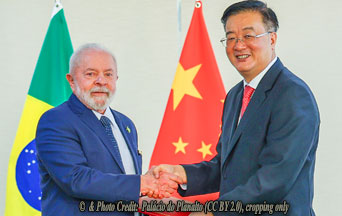
Brazilian President Luiz Inácio “Lula” da Silva is strengthening ties with China as the nation repositions itself on the world stage. This realignment includes an offer to be a world-class negotiator to mediate Russia’s war against Ukraine.
After stating Brazil would not supply weapons to Ukraine because “both sides” were at fault, Lula clearly took a position contrary to the United States and the NATO allies. The newly-elected leader has consistently advocated for left-wing totalitarianism throughout his political career. After the fall of the Berlin Wall, he teamed up with Fidel Castro in 1989 to create the Foro de São Paulo (The São Paulo Forum) as a meeting place for Latin American leftists to keep communism alive in the region.
His recent visit to Chinese President Xi Jinping solidifies his commitment to the left as he aligns Brazil with one of the world’s most notorious dictatorial states and human rights violators. Lula’s comfort with leftist despots of every stripe underscores his desire to demonstrate Brazil’s independence from the U.S. influence.
Brazil is one of the largest and fastest-growing economies in the world. Thus, his strengthening of diplomatic and economic ties with China should be a matter of great concern for the West. As an important trading partner, China has a keen interest in investing in Brazil’s infrastructure, technology and agriculture. However, history has shown that such ties always benefit China’s political agendas.
 Learn All About the Prophecies of Our Lady of Good Success About Our Times
Learn All About the Prophecies of Our Lady of Good Success About Our Times
This alliance will increase Brazil’s agricultural and natural resources exports to China while allowing the communist nation to offload its manufactured goods produced on the unlevel playing field of cheap labor and little to no environmental controls. These ties are not limited to trade, as Brazil is also forging more cultural and educational cooperation with communist China. This Brazil-China partnership also serves as a bridgehead to all of South America.
These closer relations aim to reposition the two countries as significant players in the global market and, thus, change trade patterns and old alliances to the detriment of the West.
Some experts have raised concerns about the long-term implications of Brazil’s relationship with China since it will create economic dependency on an increasingly totalitarian and despotic regime.
The shift leftward extends beyond China. Lula has also moved closer to leftist regimes in Venezuela, Bolivia, Cuba, Nicaragua and Iran. On March 4, 2023, fifty-four countries signed a joint declaration denouncing Nicaraguan President Daniel Ortega’s Stalinist style that has been crushing all of his opposition, including Catholic clergy. Lula refused to sign this declaration stating that Ortega and his victims should seek “dialogue.”
Rethinking China
The increased friendship between Brazil and China will change global politics and economic markets. Brazil is the largest country and economy in South America and Lula’s friendship with China will cause Brazil to stray further from its Catholic roots and free market successes. The ties will encourage Lula’s ever-greater socialistic reforms, and China will use Brazil to undermine its long friendship with America. This partnership could also spell disaster for all of Latin America by increasing the threats of communist ideology in the Americas.
Lula is calling for the waning of the dollar as the world’s reserve currency and the increasing use of Chinese currency swaps. He supports the Chinese-backed New Development Bank (NDB) as the alternative to the International Monetary Fund (IMF) and the World Bank. He even attended the swearing-in of a fellow Brazilian leftist as bank president. Former impeached Brazilian president Dilma Rousseff, past head of the Armed Revolutionary Vanguard-Palmares guerrilla group, will lead the bank.
The NDB will focus primarily on the developing nations referred to as BRICS, an acronym for Brazil, Russia, India, China and South Africa. It will counter the influence of the U.S. and Western allies. As the BRICS push for an alternative currency, they face the problem that none of them have the stability needed to inspire the confidence of mutual trading nations.
Eternal and Natural Law: The Foundation of Morals and Law
By partnering with China, Brazil is signaling that it no longer relies on the strength of the U.S. dollar as it attempts to secure economic stability from alternative sources. With their increased ties, the two countries are trying to create new opportunities in the global landscape that do not favor traditional Western values.
Brazil and China are paving the way forward amidst global changes that will not foster stability and peace. The changes will weaken the world economy, isolate the West and strengthen a brutal communist country. As Lula befriends America’s enemies, it will help put communist China at the helm of international affairs, promising to impoverish the world as it has done in every country where communism exists.
Photo Credit: © Palácio do Planalto (CC BY 2.0), cropping only.

